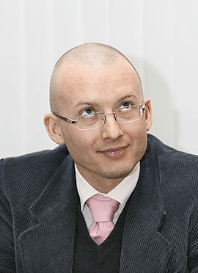 A group of international investors has pulled out of a planned joint venture fund to invest in Russian companies. The move is significant, because the fund would have been one of the earliest efforts by private foreign investors to put money into young Russian start-ups.
A group of international investors has pulled out of a planned joint venture fund to invest in Russian companies. The move is significant, because the fund would have been one of the earliest efforts by private foreign investors to put money into young Russian start-ups.
However, one the fund’s members, Eldad Tamir of Israeli financial group Tamir Fishman, tells us in a Q&A (text and picture, below) that he and others in the group may return.
The cause for abandonment? A Russian partner in the fund named Oleg Shvartsman (pictured, left) was featured in a sensational interview published in Russian business newspaper Kommersant.
Shvartsman describes how he and others in Russia use ties to government security officers to force private business owners in Russia to sell at a low price to companies connected to the Kremlin and its allies.
AI Weekly
The must-read newsletter for AI and Big Data industry written by Khari Johnson, Kyle Wiggers, and Seth Colaner.
Included with VentureBeat Insider and VentureBeat VIP memberships.
Shvartsman was a minority stakeholder in the foreign investors’ fund, known as the Tamir Fishman Russian Venture Capital Fund.
The Russian government scoffed at the article’s claims, calling them “fake.” Russian investors who we’ve spoken to off the record tell us Shvartsman wasn’t in a position to do what he claimed, noting that he was a lightweight and was just trying to make himself look more important than he was. On the other hand, such government abuse may take place. The Economist wrote of similar Russian government practices (subscription required) in August.
Tamir tells us he plans to stay removed from such political issues, and that he plans to stay away from Oleg Shvartsman. Yesterday, the European Bank for Reconstruction and Development, or EBRD, another investor in the group, said it had decided to pull out from the venture.
We’ve previously covered how Silicon Valley companies like Cisco and venture firms like Draper Fisher Jurvetson are funding Russian companies, hoping to tap into its latent technical talent and its growing economy. Indeed, DFJ is one of the three funds, including the Fishman-led group, that won support by Russia’s government to start investing in Russia. DFJ’s group hasn’t backed away from its commitment. The Fishman group includes the EBRD and undisclosed US firms, Tamir tells us.
Shvartsman’s efforts to pressure private companies can be considered a nationalization plan, though he calls it Social Investments. He also calls it “velvet re-privatization.” Here’s more:
[It’s like] a vacuum cleaner, that gathers the assets for a structure which later becomes a state corporation. Later on, [the structure] will be officially, via tenders, passed over to asset management companies, to professional teams that will generate profits.
Then, later in the interview:
These are not raids. We do not take enterprises away. We minimize their market value by means of various instruments. As a rule, these are voluntary-coercive methods. There is the market value, the mechanism to block [a company’s independent] growth, and, certainly, various administrative levers.
Note that Shartzman has more recently said he was gravely misquoted in parts of the article, although he has affirmed his belief in the nationalization and re-privatization of strategic Russian industries, as Reuters reports.
The timing of the article — if not its content — may have been part of a larger effort by a rival faction to disgrace certain current Kremlin leaders and tale their political power.
The article ran on Friday, the day the joint fund was to have been officially created but three weeks after the interview with Shartzman was conducted at an investor conference in Palo Alto, Calif. (that we attended).
Friday was also two days before Russia’s allegedly fraudelent parliamentary elections. Shvartzman’s interviews states that powerful individuals in government and industry were involved in the Social Investment effort — allies of Putin who many doubtlessly want to replace Putin leaves office and other leadership changes are made. For example, in the article, Shvartzman is quoted as saying he reported indirectly to Igor Sechin, who is deputy chief of the Kremlin staff and chairman of Russia’s state-controlled oil company, Rosneft. He later denies mentioning Sechin.
On Sunday, Kommersant tried to distance itself from Shvartsman’s words, reportedly saying he was trying to create “a certain legend for himself to make money.” Usmanov, the owner if Kommersant is an extremely wealthy industrial mogul who helps lead state-owned energy company Gazprom and also has ties to the Kremlin.
We’ve separately heard from Russian sources that Shvartsman’s company, Finansgroup, does not own and manage anywhere close the $3.2 billion in assets that other publications have reported him owning.
The fallout on Shvartman’s career in Russia has been severe, with the Kommersant itself reporting the details.
 The Q & A with Eldad Tamir (pictured, left).
The Q & A with Eldad Tamir (pictured, left).
VentureBeat: Can you provide background on the deal? You won a special bid to set up up a joint fund with the Russian government — then what happened?
Eldad Tamir: From the day we won the bid, we had to three months to raise another $40 million from other investors to match the $40 million we were putting in. It was difficult, with other investors putting money into Russia for the first time.
The EBRD supplied $15 million out of this $40 million along with with funds of funds from US, Israel and Europe — it was a good group of investors. I worked hard to make it happen.
Venture capital is a global game. Many people at Tamir Fishman speak Russian and have family from Russia. The deal seemed like something we could do easily.
All the money was already in the bank and ready to go before the interview was published.
Note: We’re professional fund managers. We are not interested in political involvement.
VB: Who is Oleg Shvartsman?
ET: At first, Shvartsman was the guy who came to me about the knowledge that there was a bid for a joint fund in Russia. He came to a venture conference in Israel.
That was his role — initiating the deal. As a result, he got 20 percent of the management company, just a minority shareholder with no active role. For some reason, he made this interview about three weeks ago.
If he weren’t engaged with us, nobody would have listened to him.
VB: What’s happening now?
ET: We’ve sat down with Russian government officials and investors. We’re holding off on starting another fund for now, but we’re looking at coming back in a few weeks to look at it in more detail.
There will be a new bid in February or March for a special joint venture. We’re probably not going to bid, then, but we are talking to the Russian economy ministry and other investors about setting up another, more regularly structured fund. The Russians want us to come back.
VB: What is the takeaway here for Silicon Valley investors?
ET: Russia is a very early stage market and it has its risks. It certainly has potential for becoming a technology center. On the positive side are the engineers and the education system. Russia is complicated and it’s very important to choose the right poeple — and very important to stay as far away as possible from politics.
VentureBeat's mission is to be a digital town square for technical decision-makers to gain knowledge about transformative enterprise technology and transact. Learn More